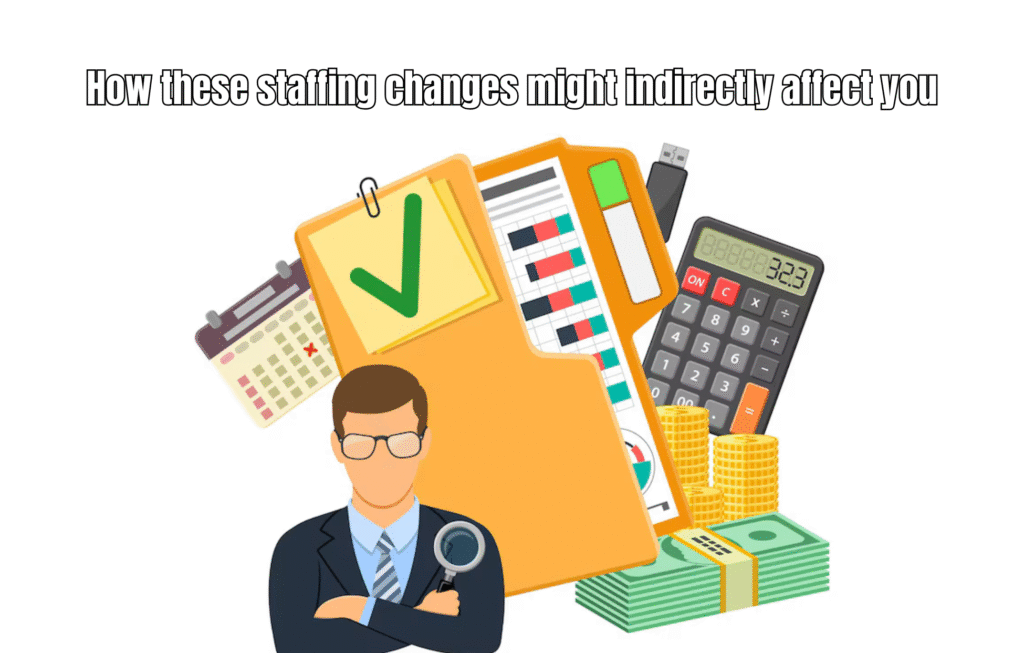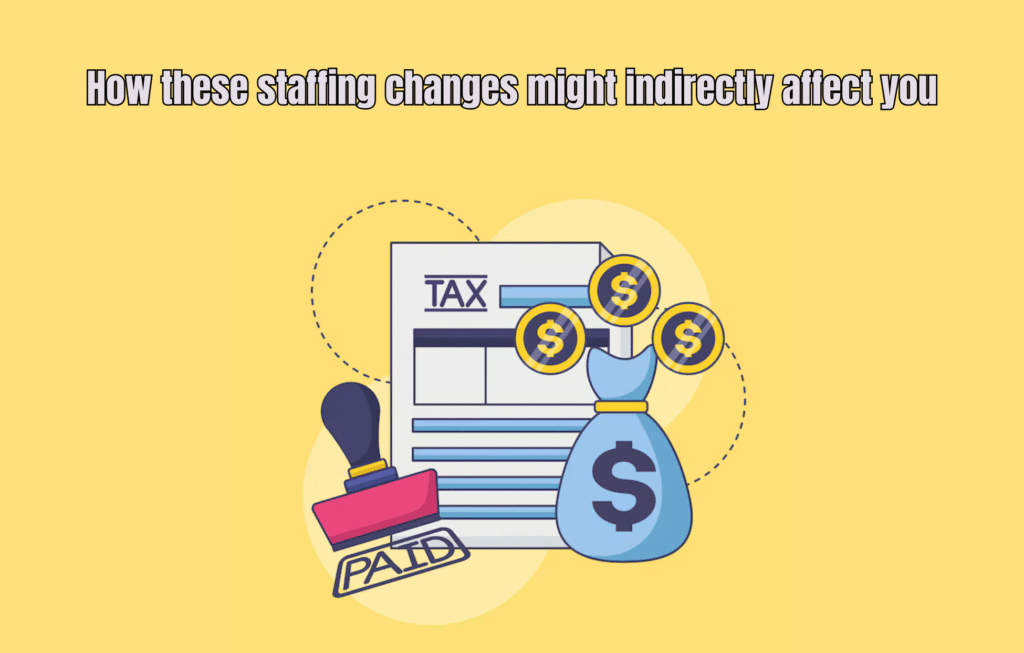Internal Revenue Service (IRS) Job Cuts: Do You Still Have to Pay Your Taxes?
What’s happening: IRS job cuts, staffing reductions & budget pressures
Over the past year the IRS has undergone significant workforce reductions and budget pressure:
- According to the agency’s own inspector‑general (TIGTA) and the National Taxpayer Advocate, the IRS workforce dropped by around 25% or more between early 2025 and mid‑2025 — from roughly 102,000 employees to fewer than 76,000.
- The cuts include large reductions in key units: for example, information technology staff (‑27%), Taxpayer Services staff (‑22%) and the large business/compliance units.
- The staffing reductions stem from a variety of sources: voluntary buy‑outs, “deferred resignation” programs, layoffs of probationary employees, hiring freezes.
- These cuts coincide with other pressures: proposed budget cuts, the end of some additional IRS funding (from the Inflation Reduction Act era) and a broader push by the administration to shrink the federal workforce.
- Operational risks have been flagged: the watchdogs warn that while the 2025 filing season went fairly smoothly, the forthcoming 2026 season may be more problematic due to depleted staffing and major tax law changes.
So the bottom line: yes, the IRS is undergoing major cuts, which has implications for its capacity, responsiveness and potentially enforcement/compliance activity.
Does that mean you don’t have to pay your taxes?
Absolutely not. The obligation to file and pay taxes remains fully in force. Here are key points to emphasise:
- The tax laws (Internal Revenue Code) still require individuals and businesses to file returns, pay tax owed, remit estimated taxes, and comply with deadlines. Staffing changes at the IRS do not change those legal obligations.
- Even if the IRS has fewer staff and slower operations, it retains legal authority to assess tax, impose interest and penalties for late payment, and enforce collection (including liens, levies, audits) unless exempted by law or statute.
- The notion that “the IRS is understaffed so you don’t have to pay” is a myth and potentially dangerous. Failure to pay or file when required can lead to significant penalties, interest and future enforcement despite staffing constraints.
- Indeed, the IRS and Treasury have emphasised that collection and enforcement remain priorities — one official noted that even with fewer revenue‑agents, the IRS intends to rely more on “smarter IT” and automation, not abandonment of collections.
In other words: job cuts do not relieve taxpayers of their responsibilities.
How these staffing changes might indirectly affect you

Although your obligation to pay remains unchanged, the staffing reductions at the IRS may influence how the process works and what you should watch for:
1. Potential delays in processing
- With fewer employees especially in Taxpayer Services and processing units, taxpayers may experience longer wait times for assistance (phone or in‑person), slower responses to correspondence, and longer processing of more complex matters.
- If you file close to deadlines or have unusual circumstances (amended returns, foreign income, etc.), allow more time for resolution.
2. Audit & enforcement focus may shift
- Some reporting suggests that with fewer agents on the ground, especially revenue agents who handle complex audits, audit activity — particularly of high‑net‑worth individuals or large corporations — may decline or slow.
- That doesn’t mean you are safe from audit: IRS still retains its authority and may use technology or targeted programs for compliance. But the resources to pursue large scale audits may be more constrained.
3. Changes in taxpayer service & assistance
- The risk of reduced service quality is real: fewer staff answering phones, fewer in‑person assistance locations, less capacity for correspondence.
- Paper return processing may be slower. The IRS has flagged delays in its “zero paper initiative” and that fewer IT staff may hamper responsiveness.
- If you rely on IRS assistance (for example due to complexity, foreign income, or tax relief) you may want to plan ahead, keep documentation well‑organised, and possibly work with a tax professional.
4. Refunds, penalties and interest still apply
- If you owe tax and don’t pay, penalties and interest continue to accrue regardless of IRS staffing levels.
- If you delay filing when required, you may incur failure to file penalties (typically 5% a month of tax due up to 25%) plus interest.
- If you file but owe and don’t pay, you face failure to pay penalties plus interest, and the IRS can enforce collection at any time.
So while the IRS may be slower in some respects, the consequences of non‑compliance haven’t changed.
What you should do as a taxpayer

Given the landscape, here are recommended actions:
- File on time and pay what you owe. Don’t delay filing or payment simply because you assume the IRS won’t notice. Even if enforcement is slower, tax liens, debt collection and penalties remain.
- If you can’t pay, communicate with IRS early. The IRS offers payment plans (installment agreements), offers in compromise, or temporarily delayed collection in certain hardship cases. Early engagement helps.
- Use electronic filing and consider tax professional help. With staffing constraints and potential processing delays, e‑filing helps speed processing and reduces chance of error. If you have complexity (business income, foreign assets, etc) professional help may reduce risk.
- Keep thorough records. Given potential delays in IRS correspondence or service, having good documentation (tax returns, income records, receipts) will help if issues arise later.
- Watch for your refund (if applicable). If you expect a refund, file early and choose direct deposit. Slower processing may mean longer wait times.
- Stay current on tax law changes. Because IRS staffing is reduced, there is a risk that guidance and form updates may lag. Make sure you’re using the correct forms and understand any new tax provisions or credits.
- Plan ahead if you owe substantial tax (for example self‑employed, large business income). Large liabilities may attract enforcement even with throat‑cut in staff. Planning avoids surprises like liens or wage garnishment.
- Be skeptical of “you don’t have to pay because IRS is understaffed” messaging. These are false claims that can lead to serious legal and financial consequences.
Why this matters for the bigger picture

The staffing and budget changes at the IRS matter beyond individual taxpayers — for the tax system overall:
- IRS collects roughly $5 trillion per year in taxes from individuals and businesses. Reductions in staffing, especially in compliance and audit units, raise concerns about the government’s ability to maintain collections and enforce tax laws.
- A reduction in taxpayer service may undermine trust in the tax system and lead to increased non‑compliance if taxpayers feel the system is broken or delayed.
- As new tax laws or reforms come into effect (some major ones are on the horizon), the IRS may struggle to implement them timely with fewer trained staff and IT resources. The watchdog has raised alarm about the 2026 filing season’s preparedness.
- The shift may also mean more reliance on automation, technology and “smart” IT rather than people. This could change how audits, examinations and taxpayer interactions happen in the future.
In short: while your obligation remains the same, the functioning of the tax system around you is under strain, and being proactive makes more difference than ever.
Final thoughts
To directly answer the headline: Yes — you still must pay your taxes. IRS job cuts do not relieve you of that requirement. What has changed is the enforcement, service and processing environment — it may take longer, be less friendly, have more delays, but the legal obligation stands.
If you’re a taxpayer (especially one with business income, unfamiliar tax situations or expected large taxes owed):
- Don’t assume “they won’t catch me” — that’s risky.
- File on time, pay what you can, engage if you can’t pay.
- Organise your documentation.
- Stay alert to the IRS status (refund timelines, correspondence, service delays).
- Consider professionals if your tax picture is complex.
Would you like more detailed information tailored for small business owners, seniors, or gig economy workers? I can customize the guidance further for your specific situation.
FAQs
1. Is the IRS really cutting jobs?
Yes. The IRS workforce has dropped over 25% in 2025, with major reductions in IT, taxpayer services, and enforcement roles due to buyouts, hiring freezes, and budget cuts.
2. Do I still have to pay taxes?
Absolutely. Your legal obligation to file and pay taxes remains unchanged, regardless of IRS staffing levels or budget reductions.
3. Could I skip filing if the IRS is understaffed?
No. Failing to file or pay can still lead to penalties, interest, and eventual enforcement. Staffing issues don’t cancel your tax responsibilities.
